For decades, Tower Records, Tower Books and Tower Videos defined the southeastern corner of 16th Street and Broadway in Sacramento.
From 1965 until Tower’s bankruptcy liquidation sale in 2006, music was sold out of a Tower Records storefront at the intersection, with a Tower Books location opening in 1976 in an adjacent building, and Tower Video opening next to it in late 1983, according to a 2010 retrospective and archival Sacramento Bee research. Across the way, stood the iconic Tower Theatre, where late Tower founder Russ Solomon first sold records out of his father’s drugstore in 1960.
Today, only the Tower Theatre and former Tower Video building still stand, with the former records and books storefronts demolished roughly six months ago. In their place could come a 53-unit apartment building — part of the next wave of development for Broadway.
Williams + Paddon is developing an apartment building on the old
site of Tower Records and Tower Books.
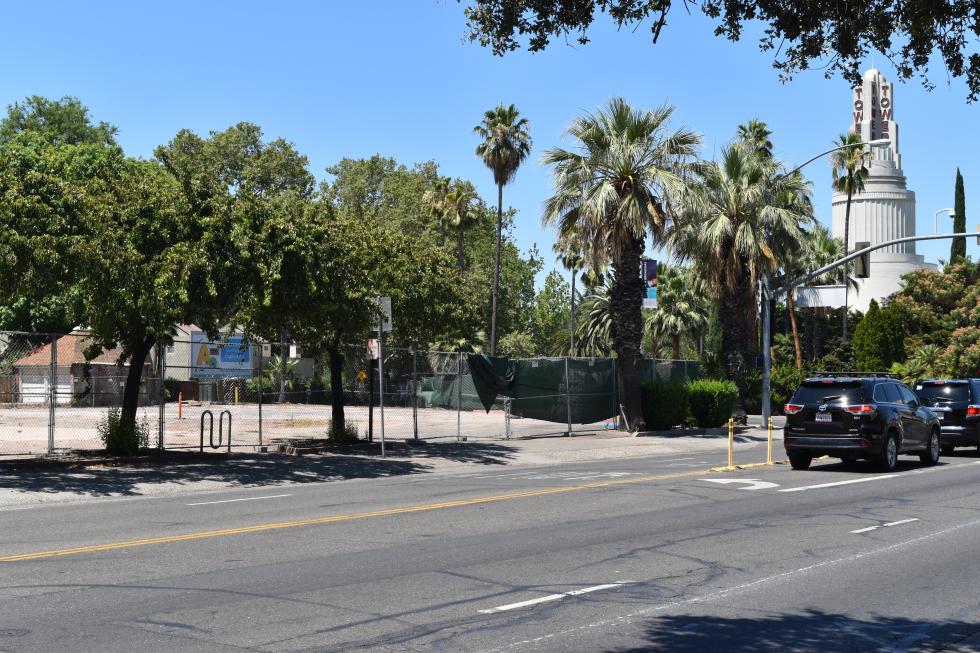
In recent years, the venerable boulevard has seen a wave of new businesses such as Selland’s Market-Cafe and Sampino’s Kitchen at Joe Marty’s, as Comstock’s previously reported in (“Boom on Broadway,” January 2019.) The businesses and the City of Sacramento’s Complete Streets traffic calming efforts have helped encourage several residential projects underway in the Broadway corridor.
Stacia Cosgrove, a principal planner for the City of Sacramento, says close to 600 residential units are “currently under review for planning approval” between 3rd Street and Franklin Boulevard in the Broadway area.
John Havard, a project manager for Williams + Paddon, the firm designing the apartment building at the former Tower site for developer Jon Gianulias, has seen the boom firsthand. “We’ve got this really vibrant corridor, longstanding neighborhood with established businesses that has … not had the market pull behind it like the rest of Midtown (Sacramento) has, and it hasn’t seen all of the great development that the rest of Midtown has,” Havard says. “So now we’ve got this collection of developers who are really working to improve that boulevard, and I think it’s going to have really great outcomes.”
A rendering of the apartment building project by Williams +
Paddom. (Rendering courtesy of Williams + Paddon)
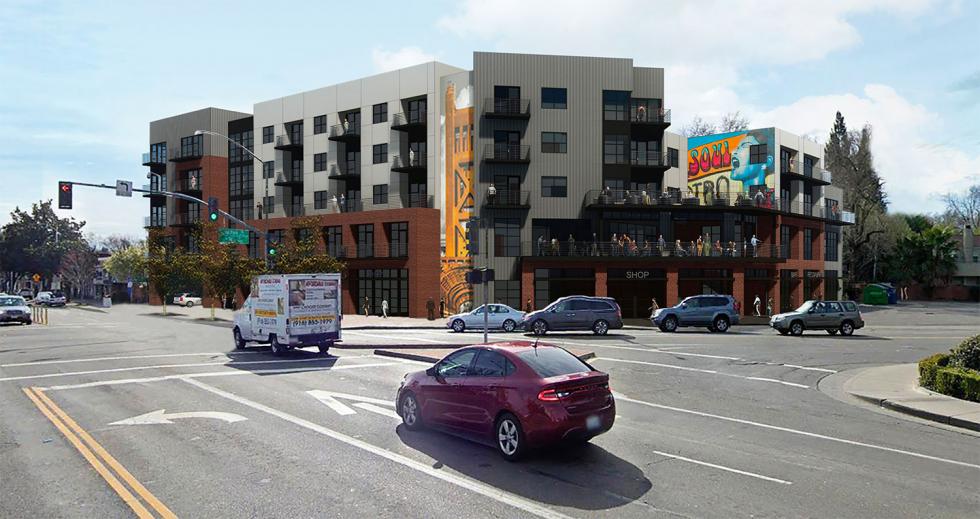
Projects include a five-story, mixed-use building by The Grupe Company that will be built on a vacant lot at 3rd and Broadway adjacent to a StorQuest Self-Storage facility; an infill housing project under construction at 9th and Broadway by Indie Capital; and an affordable housing project by EAH Housing at the site of a former state office building at 19th and Broadway that’s been shuttered for many years.
Gianulias says he’s been a member of the Broadway property business improvement district for several years, a group for property owners in the corridor.
The Grupe Company is planning to build a five-story apartment
building on Broadway.
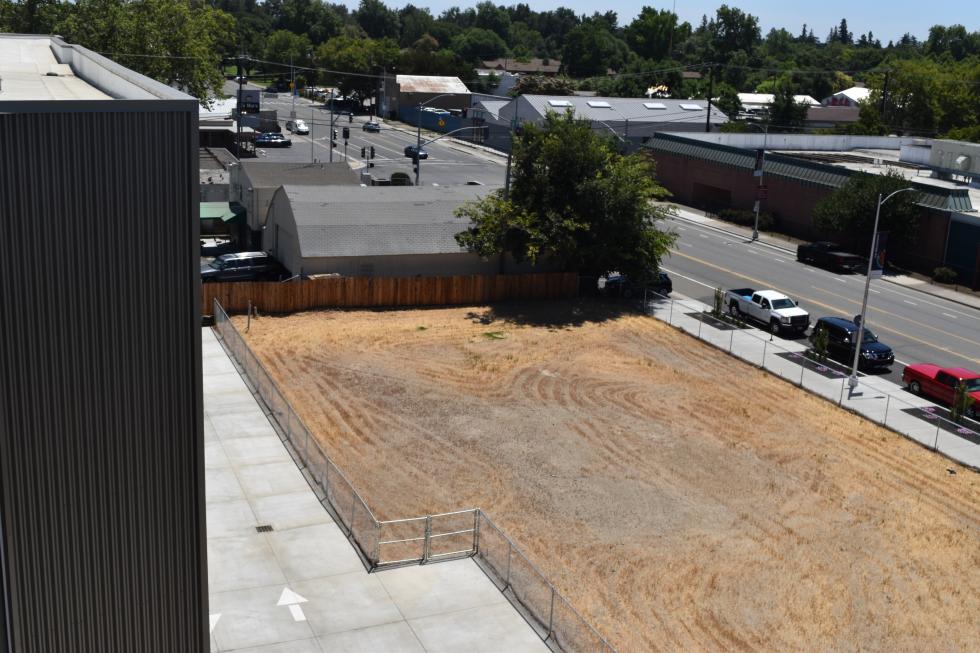
“We’re all really excited to bring more residents and kind of a more walkability and more restaurants and more activity to Broadway,” says Gianulias, who estimates his project’s cost at north of $20 million. “Cause, you know, it’s been a lot of years of, it just hasn’t been as active.”
The new housing units could support public transit and help mitigate Sacramento’s housing crisis. But some of the projects have stirred controversy, such as the former Tower site whose buildings were quickly demolished.
Councilman Steve Hansen, whose district includes the former Tower site, says he was disappointed city staff approved the demolition permit. “I think that was probably a seminal error on behalf of the city, and I think it’s jaded a lot of people about the project itself that’s come in because they feel like there wasn’t a fair opportunity to be heard around the preservation of the Tower Records site,” Hansen says.
Certainly, years after the Tower businesses ceased operations, their former buildings didn’t change that much in look, with visitors to succeeding businesses, including R5 Records, Dimple Records and Avid Reader, reminded of what once was.
William Burg, a local historian, says the city considered in 2003 making portions of Broadway a historic district, but never moved forward. In 2018, the city took another look, conducting surveys ahead of updating its historic districts the following year. “In 2018, Tower was gone, but its legacy was still going strong,” Burg says. “Those buildings might have been added as contributors to an existing Tower district.”
Havard says William + Paddon briefly discussed keeping the old Tower buildings, but the buildings were unreinforced masonry and that “seismically retrofitting those would have been extremely costly.”
Hansen says an alternative to tearing down the Tower buildings for housing could have been adding housing to a project Havard and Gianulias did across the street at a commercial building that now includes a Chipotle, but that the project team didn’t respond to his request for a meeting.
There are also height concerns. Havard says the project has been dropped down from five stories at Broadway to three stories approaching Marty Way, but some Land Park residents want a broader restriction.
Burg says the city is redoing its general plan (expected to be completed in 2021) and some Land Park residents have asked that 85-foot height limits for Broadway buildings be lowered to 35 feet on the southern side of the boulevard, 45 feet on the northern side and 55 feet along the south side of X Street. “If the city was to allow that, it would mean that none of these mid-rise apartment buildings could be built,” Burg says.
Regardless of what happens, Hansen isn’t as concerned about height, saying his rule of thumb is that buildings not overwhelm Tower Theatre. And with the former Tower Records and Tower Books site already cleared, he says, the best option is to see something built to prevent the vacant site from becoming blighted. “The project that’s come in, I think, is in keeping with the context of the site,” Hansen says. “That’s not to say every detail is perfect. But I do think it’s largely in keeping with the vision for Broadway and the desire to get residents living on the corridor.”
Havard says his team is working to enliven the intersection. Aside from apartments, the project will feature a restaurant, bar, gym, small dog park and two murals. He expects construction to be completed by late 2022.
EAH Housing is working on an affordable housing project at 19th
and Broadway.
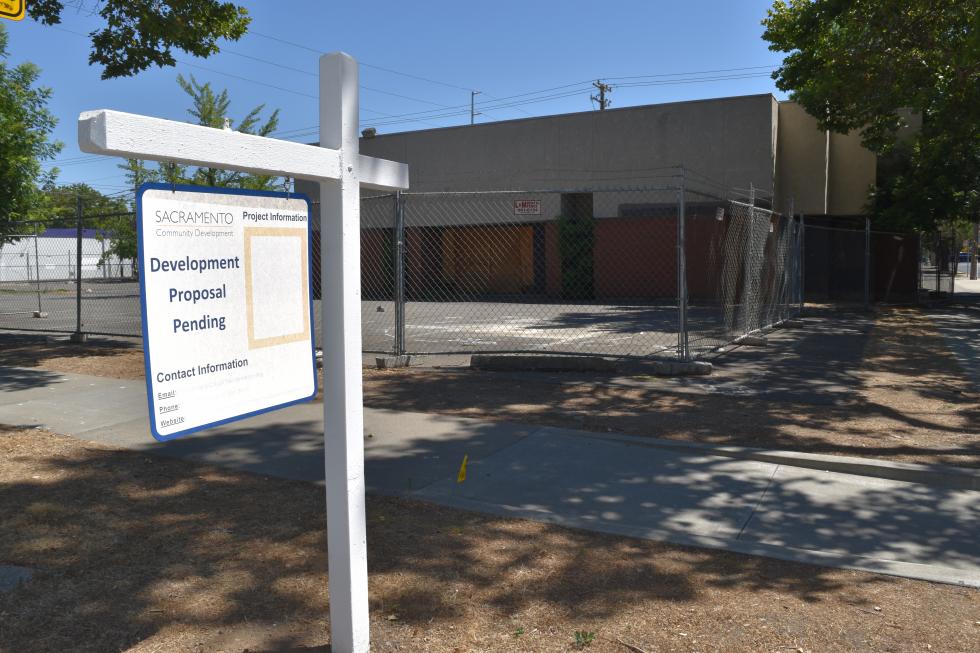
Gianulias says his family first bought the land for Tower Books and a duplex behind it in 1942. Gianulias tells of Solomon coming to his family in the mid-1970s with big news: That the City would be changing Broadway from a five to four-way stop, meaning that 16th Street would no longer run through where Tower Records would operate for decades thereafter. (Havard says the City still needs to relinquish utility rights under the old street for the sake of the project.)
The Gianulias family bought the land for Tower Records from Tower in 2006, expecting that the chain would be a long-term client though it went bankrupt months later. Solomon’s subsequent venture, R5 Records, didn’t last long. And though the building’s final tenant, Dimple, appeared successful, its owners announced last year that they were retiring.
“Spotify and Apple Music and all these apps are all about instant pull-up songs and pay for a monthly subscription rather than buying CDs and records for the most part,” Gianulias says. “Same with books and a lot of the other items. There’re all digital now.”
“So it’s unfortunate,” he adds. “We didn’t think it’d happen so quick. But we did also want to — we did buy the property in (2006) knowing it is a great intersection and someday will be a great reposition of the property and do something much better than an 1920s old brick building.”
Recommended For You

Status Check: Health Care Hanging On
Local leaders say they’re undaunted by intense fiscal impacts from COVID-19
COVID-19 has presented significant challenges for health care. At least for the moment, though, local providers have been hanging tough and looking toward economic recovery.

Status Check: Cloudy Days for Pensions?
COVID-19 might lead to even fewer defined-benefit pensions in the private sector
It’s still early to fully gauge what effects the coronavirus economic shutdown will have on the pension landscape, but the preliminary outlook for certain parts of the industry, particularly with defined-benefit plans, isn’t encouraging.
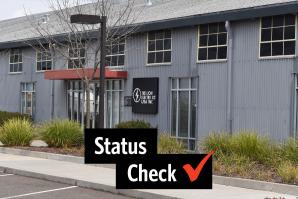
Status Check: McClellan Park
Electric school bus company that moved to the development in December may temporarily close due to coronavirus
The coronavirus has upended operations for businesses around the Sacramento region, including Lion, which was founded in 2008 and operates and repairs all-electric school buses.



